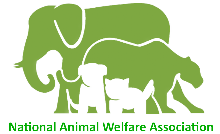- USDA new rules, and the problems they bring.
Published by -NAWA News Feed- in -USDA Updates- · Saturday 01 Aug 2020
First posted: May 17, 2020
Updated: August 1, 2020
We here at NAWA are by no means attorneys or want to be giving legal advise, but as we made our first examination of these new finial rule changes, the following are the one’s that glared out intensely. Keep in mind that this is only a partial examination, and every “true” stakeholder should read the entire finial rule HERE .
Do we believe that these new rules are extremely bad? Absolutely.
Do we believe that this is headed for Federal court? Absolutely.
From 2017 to 2019, APHIS opened up two separate public comment periods for the proposed changes. During this time APHIS reports that they received 110,600 comments from “stakeholders”. Sounds like a lot? When you break it down it is a completely telling story:
110,600 comments received.
4%, (4,619) are separate and unique comments.
23%, (25,400) are duplicate sets of “robot” emails.
73%, (79,978) are from one “animal welfare organization”, which was in the
form of a single letter written by that organization, and so-called “endorsed by its supporters”.Strangely enough, the Federal Register, (the government website that is the official source of public notices for the USDA as well as others), is only showing just over 140 people have viewed the actual proposed changes. SEE IT HERE
When NAWA saw this, you can image how fast our open records request was being assembled. Though we have not received a complete answer back from APHIS, our initial findings are pointing to this so-called “animal welfare organization” as one that has publicly stated it’s positions:
“We hope that people will stop giving their money
to animal circuses, zoos, aquariums and marine parks”

And APHIS considers them a “stakeholder” ?
Ludicrous!

________________________________
CONCERNING ITEM 1
* The rew rules removes the term AC Regional Director, as Animal Care is no longer organized under regions and regional directors. Replaces references to the AC Regional Director with Animal Care Deputy Administrator and regional offices with the appropriate Animal Care office. This puts the notorious Dr. Elizabeth Jane Goldentyer in complete charge.
________________________________
CONCERNING ITEM 2
* The new rules change the definition to mean a reasonable number of hours for inspection between 7 a.m. and 7 p.m. each week of the year, and now includes weekends, during which inspections by APHIS may be made.
________________________________
CONCERNING ITEM 3
* In the 2017 proposed rule, APHIS placed proposed language that would prohibit a license to be renewed if that person had one instance of a “Direct Non-Compliance” item during the license period:
APHIS has now removed that language, but now states: “ under § 2.11(a)(7), APHIS will not issue a license to any applicant who pled or has been found to have violated any Federal, State, or local laws or regulations pertaining to the transportation, ownership, neglect, or welfare of animals, or is otherwise unfit to be licensed and the Administrator determines that the issuance of a license would be contrary to the purposes of the Act.”
This means that if APHIS, (a Federal agency) issues and finds a non-compliance(s) item(s) , (which is a regulation) by an inspector pertaining to transportation, ownership, neglect, or welfare of your animals, then all they have to do is pull the trigger on the , “your otherwise unfit to be licensed”
________________________________
CONCERNING ITEM 4
* The new Section § 2.5(a) states that licenses will be valid and effective for 3 years, with several exceptions. This means that upon the expiration of a current license, that person/facility must reapply for a new licensee, just as if they have never had one before, and must go through the entire pre-license inspection procedures. You are not allowed a single non-complaint item during this new pre-licence procedure, otherwise your new/renewal license is not valid.
________________________________
CONCERNING ITEM 5
* In the new Section § 2.3(b), APHIS retained the existing provision that an applicant who fails the first inspection, (new or renewal) may request up to two reinspection’s to demonstrate compliance, but shortened the time frame in which the applicant must request the second inspection, and if applicable, the third inspection, to 60 days following the first inspection, instead of the existing 90-day deadline.
In short, everyone must go through the new license application every 36 months, have zero non-compliance items, and APHIS has shortened the reinspection time by 35%, (from 90 days to 60 days).
________________________________
CONCERNING ITEM 6
* APHIS now requires that license applicants disclose the anticipated type of animals to be owned, held, maintained, sold, or exhibited during the period of licensure and whether these include exotic or wild animals. APHIS expanded these restrictions to make clear that licenses are issued to specific persons, and for specific activities, animals, and approved sites, and that licenses are not valid upon changes of ownership, locations, activities, or animals. Example: if you had bears, and now obtained a camel, you must obtain a new license before you obtain the camel.
________________________________
CONCERNING ITEM 7
* In the past if exotic or wild animals were included, as APHIS required that applicants provide information and records demonstrating they have adequate knowledge of and experience with those animals. This requirement has now been removed . APHIS now requires that all licensees demonstrate knowledge and experience sufficient to caring for their animals, regardless of species.
________________________________
CONCERNING ITEM 8
* APHIS now requires to be notified no fewer than 90 days before making any changes to the name, address, substantial control, or ownership of the business or operation, locations, activities, and number or type of animals described in § 2.1(b)(2). A new license will now be required. After the licensee demonstrates compliance under the changes and fulfills all other regulatory requirements, APHIS would issue a new license with a new certificate number.
________________________________
CONCERNING ITEM 9
* The new Section § 2.1(b)(1), now requires that any person who intends to exhibit any animal at any location other than the person’s approved site must provide that information on their application in accordance with the new Section § 2.1(a)(1)(iii) and must additionally submit written itineraries in accordance with § 2.126.
________________________________
CONCERNING ITEM 10
* The new Section § 2.1(b)(2) that licenses (including dealers) will be authorized increments of 50 animals on hand at any single point in time during the period of licensure, and that licensees must obtain a new license before any change resulting in more than the authorized number of animals on hand at any single point in time.
________________________________
CONCERNING ITEM 11
* In the new rule, APHIS removed and reserved Section§ 2.6, which contained license provisions. The removed section also included the requirement for both lessors and lessees (of animals) to be licensed.
________________________________
CONCERNING ITEM 12
* In the new Section §2.10, “Licensees whose licenses have been suspended or revoked.” APHIS is adding language in paragraphs (a), (b), and (c) to require that persons with suspended or revoked licenses shall not be registered as an exhibitor, research facility, carrier, or intermediate handler, in addition to not being licensed, within the period during which the order of suspension or revocation is in effect. In paragraph (c), we (APHIS) would add that any person whose license has been suspended or revoked shall not shall not buy, sell, transport, exhibit, or deliver for transportation, any animal during the period of suspension or revocation under any circumstances, whether on behalf of themselves or another. In paragraph (a), we would replace “AC Regional Director” with “Deputy Administrator,” consistent with our proposal to update these terms.
________________________________
CONCERNING ITEM 13
* In the new Section §2.9, "Officers, agents, and employees of licensees whose licenses have been suspended or revoked." In the description of a person who has been or is an officer, agent, or employee of a licensee and who was responsible for or participated in a violation upon which an order of suspension or revocation was based, APHIS replaced "a violation" with "activities."
This new prohibition applies to licensees whose licenses have been suspended or revoked through consent decisions and orders that do not include findings of violations and other similar settlement agreements. APHIS also added that such a person would not only be prohibited from obtaining a license as a dealer or exhibitor, but would also be prohibited from being registered as a carrier, intermediate handler, exhibitor, or research facility within the period during which the order of suspension or revocation is in effect.
________________________________
CONCERNING ITEM 14
* APHIS states their reason for the new renewal process is “based on our experience with administering and enforcing the Act and regulations, we are concerned that licensees may struggle to achieve and maintain compliance after making such noteworthy changes to their animals used in regulated activity. In addition, we have observed licensees who have been licensed for many years may have difficulties with compliance because they did not have adequate programs for maintaining compliance at aging facilities. For these reasons, we consider prelicense compliance inspections important to ensuring animal welfare under the AWA and regulations and are adopting the changes as we proposed them.”
With emphasis, APHIS is saying they are “concerned that licensees may struggle to achieve and maintain compliance”. They do not say, or cite where such alleged facilities have not, or do not achieve compliance. In fact the APHIS' own Animal Impact Report clearly refutes this.
We believe as far as APHIS’s statement that their focus is defiantly on “aging facilities” that “may” have difficulties with compliance... Again, APHIS stating “may”, and do not cite or claim compliance achievement is actually not being made. Additionally, APHIS proudly has a program that has been in place that specifically deals with such facilities. The “Risk-Based Approach that is place can be found HERE.
To claim that the entire licensing community be subject to these massive changes that APHIS claims “may” exist, but even has a mechanism in place for managing these few is extremely over burdening and without a doubt capricious. (more on this to come).
"Agency action is arbitrary and capricious ‘if the agency has relied on factors which Congress has not intended it to consider, entirely failed to consider an important aspect of the problem, [or] offered an explanation for its decision that runs counter to the evidence before the agency.' " Animal Legal Def. Fund, Inc. v. Perdue ("ALDF "), 872 F.3d 602, 611 (D.C. Cir. 2017) (alteration in original) (quoting Motor Vehicle Mfrs. Ass'n v. State Farm Mut. Auto. Ins. Co. ("State Farm "), 463 U.S. 29, 43, 103 S.Ct. 2856, 77 L.Ed.2d 443 (1983) ); see also Genuine Parts Co. v. EPA , 890 F.3d 304, 312 (D.C. Cir. 2018) ("An agency action is arbitrary and capricious when, inter alia , the agency has ‘entirely failed to consider an important aspect of the problem [or] offered an explanation for its decision that runs counter to the evidence before the agency.' " (quoting State Farm , 463 U.S. at 43, 103 S.Ct. 2856 ) ). [Citizens for Responsibility & Ethics in Wash. v. Fed. Election Comm'n 316 F. Supp. 3d 349 (D.D.C. 2018)]
________________________________
CONCERNING ITEM 15
* APHIS does not have the authority to set an expiration date on a license under The Animal Welfare Act.
Section § 2133 of the Animal Welfare Act states:
§ 2133 - Licensing of dealers and exhibitors.. The Secretary shall issue licenses to dealers and exhibitors upon application therefor in such form and manner as he may prescribe and upon payment of such fee established pursuant to 2153 of this title: Provided, That no such license shall be issued until the dealer or exhibitor shall have demonstrated that his facilities comply with the standards promulgated by the Secretary pursuant to section 2143 of this title: Provided, however, That a dealer or exhibitor shall not be required to obtain a license as a dealer or exhibitor under this chapter if the size of the business is determined by the Secretary to be de minimis. The Secretary is further authorized to license, as dealers or exhibitors, persons who do not qualify as dealers or exhibitors within the meaning of this chapter upon such persons’ complying with the requirements specified above and agreeing, in writing, to comply with all the requirements of this chapter and the regulations promulgated by the Secretary hereunder.
By the order of Congress the issuance of a license is valid without interruption, unless the agency starts administrative procedures under Section §2149 Violations by Licensees. The agency is however authorized to prescribe the “form and manner” in which a license is maintained, ex: renewal paperwork requirements, inventory updates, contacts, location sites, annual maintenance fee’s, etc. [Recently Federal Circuit Judge Griffith suggested the same opinion, Animal Legal Defense Fund, et al vs. USDA, 16-5073]
________________________________
CONCERNING ITEM 15
* APHIS has had a long standing understanding of this and has made this know in other cases:
“7 U.S.C. § 2133. In accordance with this statutory language, the Secretary has promulgated regulations governing the issuance of an initial license. These regulations provide, among other things, that “[e]ach applicant for an initial license must be inspected by [the USDA] and demonstrate compliance with the regulations and standards, as required in paragraph (a) of this section, before [the USDA] will issue a license.” 9 C.F.R. § 2.3(b).
"The AWA, however, is silent as to the requirements, if any, for renewal of a license once it is issued. Indeed, the statute does not even require renewal of an issued license at all or contemplate that a license, once issued, will expire after a designated period of time. Instead, the statute contemplates that an issued license may be suspended or revoked pursuant to enforcement proceedings for AWA violations, which proceedings have explicit due process protections, including notice and an opportunity for a hearing. See 7 U.S.C. § 2149(a). “ [“Defs.' Mot. to Dismiss Supplemental Complaint (“Defs.' Mot.”), ECF No. 37;” Animal Legal Defense Fund v. Vilsack, 169 F. Supp. 3d 6, 8 n. 2 (D.D.C. 2016)]
________________________________
CONCERNING ITEM 16
* APHIS has long held that requiring a licencee to go though the pre-license procedure each time as a renewal is more burdensome and unrealistic:
“USDA asserts that its renewal scheme balances the AWA's "dual, but sometimes competing, goals of protecting both the animals and the businesses that exhibit them." Appellees' Br. 33. The agency has explained that it would be too burdensome to require more from applicants in the context of license renewals than the regulations currently demand. See 69 Fed. Reg. 42,094. Specifically, USDA contends it would be "unrealistic" to make renewal contingent on licensees having no citations whatsoever”. Id. [Animal Legal Def. Fund, Inc. v. Perdue]
___________________
“Applicants for license renewal now [sic] certify that he or she is, to the best of the applicant’s knowledge and belief, in compliance with the regulations and standards and agrees to continue to comply with the regulations and standards by signing the application form, which will contain a statement to that effect. The certification will not necessitate the use of lengthy forms or the imposition of significant additional paperwork burdens. As mentioned above, APHIS does not intend for the certification to take the place of inspections.” [Federal Register / Vol. 60, No. 50 / March 15, 1995 , 13894]
___________________
“USDA argues that the statute “is silent as to the need for license renewal and any requirements for renewal.” Appellees’ Br. 24 (capitalization and emphasis omitted). As a result, the agency asserts, the court should defer to its reasonable interpretation that no “demonstration” requirement is applicable to renewal applications. Id. at 22. The Government relies on the Eleventh Circuit’s analysis of the definition of “issue” in a similar case, arguing that its plain meaning “does not necessarily include ‘renew.’” Id. at 26 (quoting ALDF, 789 F.3d at 1216). It urges the court to adopt the Eleventh Circuit’s position that “[n]o license is given out during the renewal process” and that “Congress has [not] spoken to the precise question” of whether § 2133 governs renewals. Id.; see also People for the Ethical Treatment of Animals v. USDA, 861 F.3d 502, 509 (4th Cir. 2017). “ [Animal Legal Def. Fund, Inc. v. Perdue, 872 F.3d 602 (D.C. Cir. 2017)]
________________________________
CONCERNING ITEM 17
* Interesting Admission by APHIS - Note: “The current regulations do not require a licensee to demonstrate compliance when making changes to his or her animals or locations, including noteworthy changes to the numbers or types of animals used in regulated activity.” [p 13 of the pre-published register]
It is known to that many facilities have received non-compliance write up’s at additional locations where APHIS has continuously alleged that any additional site a licensee has must obtain a compliance inspection before it operates from that additional site. APHIS is now publically acknowledging they have been incorrect.
________________________________
CONCERNING ITEM 18
* APHIS reported they were advised by commenter’s who pointed out to APHIS that by proposing to switch from a system of annual renewals to a new license requirement, APHIS is enabling litigation from activist groups that disagree with the conclusions of APHIS inspectors regarding prelicense inspections and AWA compliance, resulting in substantial legal costs for both APHIS and exhibitors. Also adding that APHIS’ rulemaking proposal is unnecessary because, as the Federal courts have held, APHIS already has ample authority under the AWA to bring enforcement actions against licensees whose compliance performance slips.
APHIS acknowledge they have authority under the AWA to enforce the regulations
on licensees in noncompliance and will do so as warranted. However, they disagree with the commenter’s and consider the proposed changes to licensing to be necessary because the existing regulations do not require an applicant for a license renewal to demonstrate compliance before renewing his or her license, nor do they require a licensee to demonstrate compliance when making any changes to his or her animals.
Again APHIS’s reason for switching to the 3 year renewal process is because they "(APHIS) have observed licensees who have been licensed for many years struggle with compliance because they did not have adequate programs for maintaining compliance at aging facilities."
“We (APHIS) determined that in order to reduce risks to animal welfare and the public, licensees should be required to demonstrate compliance and obtain a new license to ensure that aging facilities remain in compliance. For applicants who have a history of compliance, they should be able to confidently demonstrate compliance during the initial prelicense inspection, generating a record that will be defensible in any subsequent litigation.”
So what they are telling us is rather than focusing on possible aging facilities, and conducting the practice of “risk-based” inspections (as they report here), as they are already doing, they prefer to target the entire industry.
In regards with the uncontested idea, (from APHIS) that the new process is enabling litigation from activist groups that disagree with the conclusions of APHIS inspectors regarding prelicense inspections and AWA compliance, resulting in substantial legal costs for both APHIS and exhibitors, APHIS does not deny this, but rather stated that “applicants who have a history of compliance, they should be able to confidently demonstrate compliance during the initial prelicense inspection, generating a record that will be defensible in any subsequent litigation.” APHIS is not considering the fact that is cost these facilities to defend itself, even if they are in the right. The threat of litigation is still real.
APHIS obviously is not denying this, but rather believes it’s “defensible”, but does not concern itself with the cost of litigation licensees will be subjected to in presenting this “defensible” material to a court [p 44]
________________________________
CONCERNING ITEM 19
* During the last year we have seen animal rights groups attempt to install language in state and local laws that would require all facilities, (in their state) never receive any write-up's or non-compliant items as they relate to the AWA. These groups attempted this here as well:
The new Section § 2.5(a) states that licenses will be valid and effective for 3 years, with several exceptions. One exception, in § 2.5(a)(1), is if the license has been "revoked or suspended pursuant to section 19 of the Act." Animal rights groups strongly pushed that they add "or these regulations" to the end of this exception.
APHIS disagreed with that as well and affirmed that "the provisions of the rule regarding license suspensions and revocations are authorized by section 19 of the Act and its implementing regulations.", and therefore sufficient. This is worth remembering as the local and state legislation battles continue.
________________________________
These are just a few of the concerns we noted as we made our first examination of the new rules. One thing not to be confused with is thinking that “rules” such as these are just some sort of non-binding policy or position of an agency. They are not. Rules are the same as regulations that are enforceable by an agency.
A regulation is created by a governmental agency, often to actually implement a given law, (such as the Animal Welfare Act), and does not have to go through the bill process, but rather the Rule Making Process as explained in the Administrative Procedures Act. Laws are also rules that govern everyone equally, while regulations only effect those who deal directly with the agency, such as USDA/APHIS who is enforcing them.
Again, we strongly encourage all licensees to read in detail what
these new rules will be, (click here)
Do we believe that these new rules
are extremely bad? Absolutely.
Do we believe that this is headed
for Federal court? Absolutely.
More to come, . . . . .



